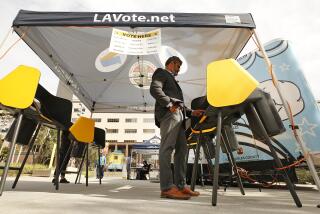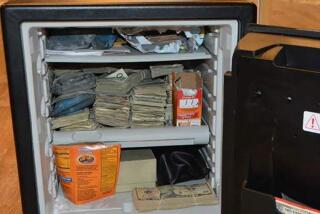Businessman Guilty in $1.4-Million Scam
- Share via
It wasn’t the ending Frank Boyd Cockrell II would have scripted.
After a six-week trial, the embattled financier and wannabe screenwriter was found guilty Monday of grand theft, money laundering and tax evasion for swindling investors out of $1.4 million.
The jury’s verdicts--handed down after three days of deliberations--ended one of Ventura County’s largest securities fraud cases and set the stage for another sensational trial.
The 49-year-old Sherman Oaks businessman now faces separate charges of attempted murder in Los Angeles County for allegedly plotting to blow up the Ventura County Courthouse to conceal evidence in the fraud case.
The bombing trial was put on hold until the conclusion of the Ventura County case.
“This is the end of a long, long road,” Deputy Dist. Atty. Mark Aveis said outside the courtroom, recalling how the case was slowly put together during the past four years.
Cockrell and five others were indicted by the Ventura County Grand Jury in 1995 on charges that they swindled investors in a bogus money-making scheme, and bilked insurance companies for an additional $800,000.
Among his victims, Cockrell swindled wealthy authors, doctors and other well-to-do investors who sunk hundreds of thousands of dollars into phony financial scams.
Of the 24 charges--some of which address only the co-defendants--Cockrell was found guilty of 13 offenses. Those include theft, grand theft, money laundering and tax evasion.
Cockrell, who showed no reaction as the verdicts were read, was found not guilty on one charge of securities fraud because of what jurors later described as a “technicality” in the law.
Speaking with Aveis and defense attorney Edward Whipple later outside the courtroom, jurors said they were not swayed by Cockrell’s defense and were even more unimpressed by his statements on the witness stand.
“I took Cockrell’s testimony--everything he said--and threw it out the window,” said one juror.
Cockrell told the jury that he was friends of several wealthy families, including the Gettys and millionaire oil barons in Texas. He also said he was a descendant of the family that founded the Sears, Roebuck Co. retail chain.
According to trial testimony, Cockrell spent a lifetime building the lifestyle he needed to lure wealthy investors: living in a million-dollar mansion, driving a Rolls Royce and wearing expensive suits.
He also bragged about being one of the seven richest men in California and carried a name card promoting himself as a comedian and Screen Actors Guild member, witnesses said.
While prosecutors argued that Cockrell was a self-serving braggart motivated by greed, the defense suggested he was running a legitimate business that failed.
Cockrell also testified that he was a victim of a government conspiracy--a suggestion that didn’t sit well with the jury.
Juror Tom Miglis said Cockrell’s conspiracy theories prompted most jurors to roll their eyes incredulously when his testimony was later discussed in deliberations.
“The thing that stuck with me the most was his inability to take responsibility for his ventures,” Miglis said of Cockrell’s various financial schemes.
In terms of the bomb plot evidence--which the jury was allowed to hear after prosecutors successfully argued it showed the defendant’s “consciousness of guilt”--jurors said it was disturbing but had little bearing on their verdicts,
An undercover agent for the Bureau of Alcohol, Tobacco and Firearms testified that Cockrell was so angry about the fraud case that he tried to hire a group of anti-government militiamen to blow up the Ventura County Courthouse.
ATF Agent Charles Pratt told jurors that before the case went to trial, Cockrell solicited him to destroy the building and in the process “kill as many D.A.s, judges and investigators” as possible.
Pratt said Cockrell also wanted to knock down two freeway overpasses with a rocket launcher, ignite a fire at an oil refinery and rob jewelry stores in Ventura County, where he thought he was being mistreated.
Cockrell then wanted to write a movie script about his campaign of murder and mayhem, Pratt testified.
But those allegations--which some jurors called frightening and bizarre--had no bearing on their ultimate decisions in the case, jurors said.
“It didn’t play any role in what we were deciding,” foreman Paul Schaeffer said.
Cockrell faces up to 17 years in prison and is scheduled to be sentenced May 22.
More to Read
Sign up for Essential California
The most important California stories and recommendations in your inbox every morning.
You may occasionally receive promotional content from the Los Angeles Times.













